
BEd (Hons) Primary Education - Early Years (with QTS)
Become a primary school teacher with a specialism in early years.


Top 5 for in England for Education
The Guardian University Guide 2024

Apply now for this course

Keep in touch with this course
Entry requirements
Three A-levels at grades BBC or above
Or BTEC triple grades DMM or above
Or Access 30-42 D/M with min 18D
Or T level M
And GCSE English Language, Mathematics and Science at grade 4 or grade C or above
We are committed to safeguarding and promoting the welfare of children and trainees. All trainees are expected to share this commitment and demonstrate consistently high standards of personal and professional conduct.
UCAS points 112
UCAS code X310
UCAS institution code P63
Duration Three years full-time
Full entry requirements
As this is a professional programme, all candidates are interviewed and we look for a range of attributes and candidates must take part in an individual and group interview with representatives from schools as well as University tutors.
A DBS (Disclosure and Barring Service) check is required.
We have a responsibility to ensure that trainees have the health and physical capacity to teach. Candidates must meet the Secretary of State’s requirements for physical and mental fitness to teach as detailed in ‘Fit to Teach’ by completing an on-line medical questionnaire.
The Skills tests no longer exist as an entry requirement however, all teachers are expected to be competent in fundamental English and Mathematics. We will be assuring that trainees have these skills either during the selection process, or later during the training programme.
Please note that Level 2 Key Skills in Application of Numbers and Communication or Certificates in Adult Literacy or Numeracy, are not sufficient to meet the entry requirements to a BEd programme.
Course Summary
BEd (Hons) Primary Education - Early Years with Qualified Teacher Status (QTS) is the ideal preparation for a successful and rewarding career in primary or early years teaching. QTS enables you to embark on your teaching career straight after finishing your studies.
This comprehensive course allows students to explore their love of teaching with a specific focus on the Early Years Foundation Stage and Key Stage One, with an overall primary coverage.
Building on long established partnerships with a diverse range of schools, all students have ample opportunities to learn with experienced primary and early years practitioners. From the start of the course students work in a range of schools gradually building up confidence and expertise.
The curriculum is based around three themes and these are embedded in all MTEP modules across our provision and is carefully structured to provide you with the skills and subject knowledge required to teach all the National Curriculum subjects as well as providing specific opportunities to teach in nursery and reception classes.
The themes are:
- The professional role of the developing teacher
- Development of teaching and learning
- Curriculum and specialisms
Our processes are aligned with the MTEP curriculum, the CCF, the ECF, the ITE Ofsted inspection framework and the Teachers’ Standards and explicitly considers how all components are sequenced incrementally to build your expertise and confidence. You are taught, trained and supported at both the centre and on placement by expert colleagues.
This breadth of experience will enable you to specialise with the age groups you particularly enjoy working with whilst ensuring you have the skills required by all primary schools. Through working with experienced and passionate tutors in interactive and practical teaching sessions you’ll develop a thorough grounding in all the major skills and issues of education including special educational needs and disabilities, behaviour management, planning and assessment, managing the teaching and learning of a classroom team, child development, cognitive science and learning through play. In years two and three you will focus more specifically on early years practice. You will also select an early years focus for your final-year research dissertation.
Student feedback about the course is consistently positive and the course scored 100% satisfaction in the National Student Survey 2022.
By combining academic study and practical experience in a range of placement settings in the South West or East London, you are fully prepared to progress to your Early Career Teacher (ECT) period. Our extensive network offers opportunities such as working in special schools, outdoor centres and other educational settings or leading specific projects with children and young people as part of the enhanced placement.
All BEd students can join the Primary Science Enhancement Award scheme (PSEA). The PSEA, developed by the Primary Science Teaching Trust, gives student teachers the opportunity to increase their understanding and experience of teaching and learning in primary science. In the recent pilot it was found that students reported increased confidence to teach science, and a greater awareness of where to find support for this.
Why this course at Marjon?
Maximises opportunities to teach in both primary schools and early years settings when you qualify
Diverse range of placement schools and early years settings including East London, to prepare you to teach in any type of school
National curriculum subjects and the Early Years Foundation Stage covered by specialist tutors delivered in our specialist primary classrooms and in schools
High quality, personal support in schools and on campus
Forest school and outdoor learning experiences
High quality training and outcomes – almost all trainees are graded as good or outstanding
Modules for this course
Course Snapshot
“ You start by learning what it takes to be an outstanding teacher and take that into your first teaching placement. As well as a focus on developing your core subject area skills, you will develop skills in planning, delivering and reviewing lessons. Further teaching practice takes place in the second year and subject knowledge is built up in foundation subjects. You’ll focus on how to teach for different needs in the classroom, including special educational needs. In the third year you will develop knowledge in a specialism of your choosing, undertake a dissertation and take on a substantial teaching placement.”
1st Year
An Introduction to Professional and Academic Skills for the Teacher including First Teaching Placement
Early Learning and Child Development
Foundations for Learning
Curriculum Studies: Core Subjects
Curriculum Studies: Foundation Subjects
2nd Year
Developing Professional and Academic Skills for the Teacher including Second Teaching Placement
Inclusive Practice: Meeting the Needs of All Learners
Play, Learning and Development
Curriculum Studies: Developing and Deepening Core Subject Understanding
Planning for learning in the Early Years
3rd Year
Professional Studies: Current issues for the EYFS Specialist
Teaching Placement Phase 4 QTS
Early Learning in a Nursery Setting
Honours Level Dissertation
Current students say...
Annie Howard
“I love that we put theory into practice as much as possible, making our lectures and seminars fun and memorable. Our lecturers have made a massive effort to continue this during the switch to online learning, so we are never staring at a screen for too long. We receive a great amount of support. I know that I can always email any of my lecturers and will receive advice that they have put time and effort into, or I can contact my personal tutor if I just need a chat about how things are going.”
Shona Hawke
“School placements are a real highlight for me. It is great to be able to put theory into practice and learn first-hand from qualified teachers in the classroom. Being a mature student, I had not been to school for a long time but with the support of the lecturers I’ve improved my academic skills. The social side of coming to university has been a really positive experience and I have loved meeting new people and making new friends for life. I’m happy to be a part of the Marjon family.”
This course is perfect if you’re curious about these questions:
Why is play so central to learning?
How do children learn effectively?
How can I promote a love of learning in all children?
What is ‘dough disco’?
What can learning outside the classroom bring to a child's experience in school?
What is the value of building strong relationships with children and parents?
“ I have been very impressed with the depth of knowledge and understanding shown by the students. They are privileged to have such dedicated and hardworking staff who clearly enjoy working together to produce the very best outcomes. It is apparent that the Marjon BEd student is immersed in a wealth of high quality opportunities and experiences to prepare them for their future role in teaching.”
What might you become?
On completion you will be able to teach in a Primary or Special school or Early Years setting as an Early Career Teacher (ECT). Graduates from this course have progressed quickly into specialist or leadership positions in a wide range of schools and locations. Ofsted (2014) praised the University’s ‘effective use of local diversity and wider links which ensures trainees have breadth and variety in their training, so making them highly employable’.
See where our graduates are now
Claire Watson
Placements provided the experience I needed to understand the diverse role of teaching. The lectures provided theory, practical lessons and strategies on how to teach all aspects of the early years and national curriculum. This meant I felt confident when starting work, as I had working knowledge of what the children needed to learn, how to teach it, and how to make learning fun and engaging.
Teacher FS/Y1. Oakwood Primary Academy.
Emily Bryant
“The course is structured so you have opportunities to develop your teaching and use the most effective research-based approaches. My lecturers went above and beyond to ensure I understood the theory of early child development and that I put this into practice on placements. They adapt the course each year to ensure it’s relevant to the current teaching climate and supported me in the search for my first teaching role. I finished feeling confident to start my Early Years teaching career.”
Emily is an Early Years Lead in a school
Lucy Trevarthen
“The small class size meant that I felt as though every lecturer knew me well and cared about me. They are so approachable that I felt comfortable asking for support whenever I needed it. The interactive lectures made learning enjoyable and created a relaxed learning atmosphere. Placements in three different schools enabled me to work with a variety of children. Now I am teaching my own class and often find myself thinking back to specific lectures and using the techniques I learnt.”
Lucy is a Reception class teacher in inner-city London
Ask a student
How you’ll be taught and assessed?
How will you be taught?
Mainly delivered in our specialist primary class rooms, often in small group workshops. Sessions are practical and interactive to mirror primary school and early years scenarios. You will also have lectures, seminars, tutorials, experiences in schools and early years units and in outdoor locations, both on and off-site.
How will you be assessed?
Assessment is by coursework only through a range of creative assignments including portfolios, presentations, designing and making resources and written assignments. Placement assessment is carried out by school mentors and university tutors against the three themes of the MTEP curriculum:
-The professional role of the developing teacher
- Developing teaching and learning
- Curriculum and specialisms

Scott teaches across the BEd Primary programmes and specialises in English. He taught for over 20 years, was a lead English teacher across South Devon, and is passionate about children's literature.
Fees and funding
Fees UK students: £9,535 per annum
Fees for International students: £14,600 per annum
This fee covers your tuition and access to course-specific equipment and facilities, as well associated services including access to the library, study skills support, IT support, student support and wellbeing services and membership of the Student Union. There may be additional costs by course.
Funding available for this course
Our Student Funding Advisors offer confidential and impartial advice about your funding options.
Learn moreLecturers

Michelle teaches on our undergraduate and postgraduate teacher training programmes with a specialism in Mathematics and Early Years Education.
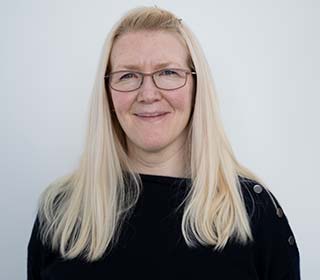
Ruth has been at Marjon for 4 years and teaches across the primary education programmes. She taught in primary schools in Devon for 14 years and was Head of School for 8 years. She is the subject tutor for history. She is Programme Lead for the Primary PGCE and specialist pathways.
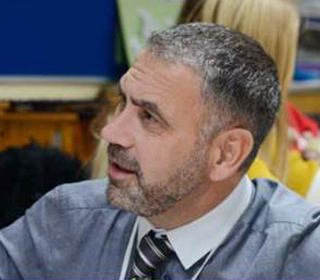
Mark Andrew Dearden is a Senior Lecturer for the Marjon Teacher Education Partnership at Plymouth Marjon University.
His present role makes use of my key skills in contextual and educational studies, teaching and learning in the primary school, development of professional roles in students and teachers and subject specialisms of Art and Design and Religious Education.
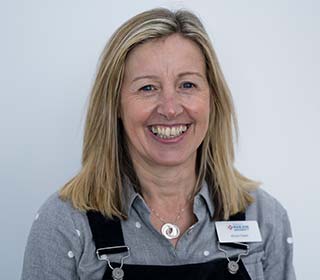
Alison is a 'Specialist Leader in Education' and former Head Teacher. She teaches science and professional studies and has a PG Cert in coaching and mentoring.
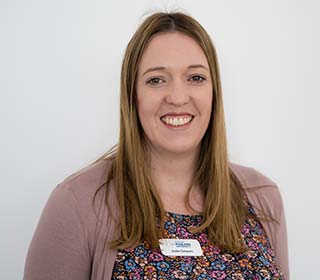
Jodie teaches on our teacher training courses, specialising in primary science as well as supporting students on placement. She is the Head of ITT and she also supports primary colleagues across the city and beyond through her work with Plymouth Science.
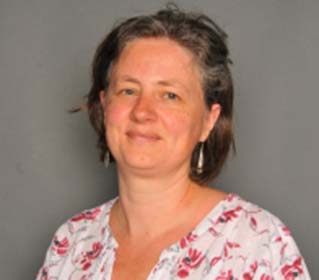
Tara specialises in teaching primary mathematics and is also currently involved with an international project about making maths more accessible to primary aged children and their parents.

Alex specialises in Special Educational Needs and Disabilities (SEND) and is currently working towards a Masters Degree in Mental Health.

More information
See the how to get into teaching guide for tips from our lecturers and trainees spanning every stage of your teacher training journey, from making your application shine through to securing your first teaching role.
Apply now for this course
Find out more about studying BEd (Hons) Primary Education - Early Years (with QTS) at Marjon

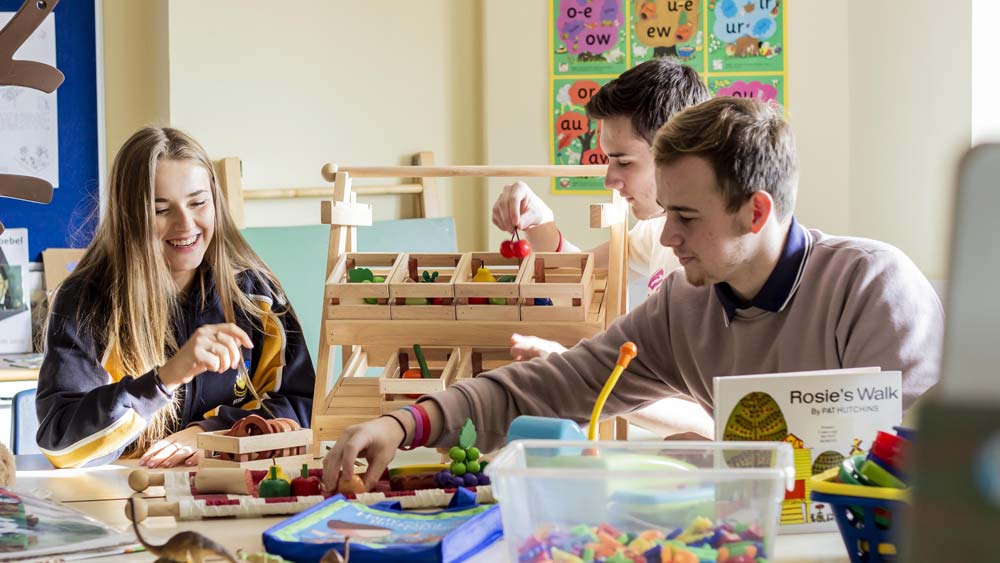
Discover Uni collects data about university courses in the UK. All universities publish Discover Uni data on their online course pages enabling you to compare similar courses at different universities.


